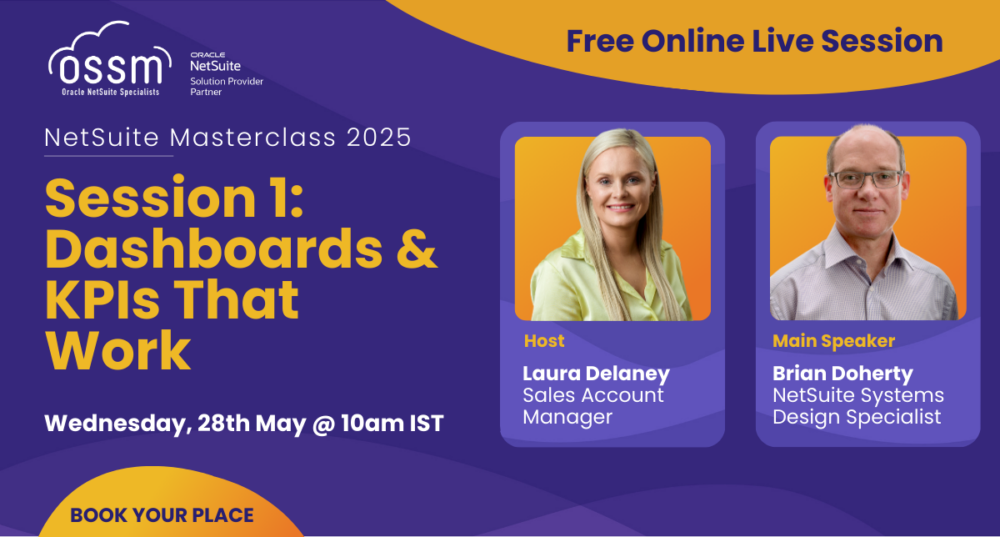
- AI, NetSuite ERP
Artificial Intelligence (AI) is reshaping how businesses operate across all industries. From accelerating decision-making to reducing time spent on manual tasks, AI is becoming a powerful tool for businesses looking to stay competitive. As ERP systems evolve to meet this demand, organisations are increasingly seeking smarter, more automated solutions to drive growth.
According to a 2023 IDC report, more than 65% of businesses now consider AI essential to their ERP strategy. This growing reliance on AI reflects the urgent need for modern businesses to adapt to rapid change. With its AI-powered capabilities, NetSuite ERP delivers key advantages that help businesses boost performance, improve efficiency, and make better-informed decisions.
As experienced NetSuite ERP partners, OSSM is helping businesses across the UK unlock the value of intelligent ERP. Here are some of the key reasons why NetSuite ERP is a smart choice for businesses embracing AI:
1. Seamless AI integration
AI capabilities within NetSuite are built into the platform, eliminating the need for additional tools or lengthy setup. Users gain instant access to embedded AI features designed to support everyday tasks. One example is ‘Ask Oracle’, which enables natural language queries, making it easier to search, find, and take action within the system.
2. Customisable AI features
NetSuite gives users the flexibility to tailor AI tools through APIs and tools like SuiteScript GenAI. These customisable options allow businesses to align AI features with their workflows. Even features like Text Enhance, though simple at first glance, can be extended using Prompt Studio to deliver targeted functionality.
3. AI and data-driven decision-making
While SuiteAnalytics Assistant is expected in the next release, NetSuite already provides advanced reporting tools through its platform. Businesses can also take advantage of the NetSuite Analytics Warehouse (NSAW), a robust data warehouse similar to Power BI. NSAW allows users to connect to external data sources, including Excel and third-party databases, making it easier to build comprehensive, AI-enhanced reports.
4. Efficiency at the core
NetSuite supports financial decision-making with intelligent features like Financial Exception Management, which identifies anomalies and helps prevent costly errors. These insights are key to helping businesses stay ahead of risks and act quickly when issues arise.
5. Enhanced personalisation
AI tools in NetSuite improve workflows across key business functions, including finance, supply chain, and sales. For instance, the Supply Chain Control Tower uses AI to help detect disruptions and highlight areas of concern, allowing teams to take proactive measures before problems escalate.
Intelligent Item Recommendations enable NetSuite users to enhance customer experiences by offering tailored product suggestions. This data-backed personalisation not only improves user engagement but also supports upselling and cross-selling efforts.
6. Built for the future
Running on Oracle Cloud Infrastructure (OCI), NetSuite provides the scalability and security businesses need to grow with confidence. As AI continues to evolve, companies using NetSuite are well-positioned to adopt emerging technologies without disruption.
7. Real-time interaction and accessibility
By allowing users to interact with AI through conversational prompts, NetSuite empowers more teams to benefit from intelligent features without requiring deep technical expertise. This inclusive approach helps businesses realise faster returns on their ERP investment.
Final Thoughts
The shift towards AI-driven ERP is well underway, and NetSuite is leading the charge. With embedded AI, customisable features, and powerful analytics tools like NSAW, businesses can unlock real value from their data.
Working with trusted NetSuite partners in the UK, like OSSM, ensures a smooth implementation and ongoing support to maximise the benefits of NetSuite ERP.
Discover how OSSM can help your business harness the power of intelligent ERP to drive long-term success.
About the Author

Brian Doherty
Brian is an accomplished Project Manager with a background in the ERP software industry. He possesses expertise in Business Process, Sage Products, NetSuite, Requirements Analysis, and Technical Support. As the Operations Director of OSSM, a member of the Noledge Group, Brian has directly implemented or been involved in the implementation of NetSuite ERP cloud-based software in various businesses across multiple sectors.





